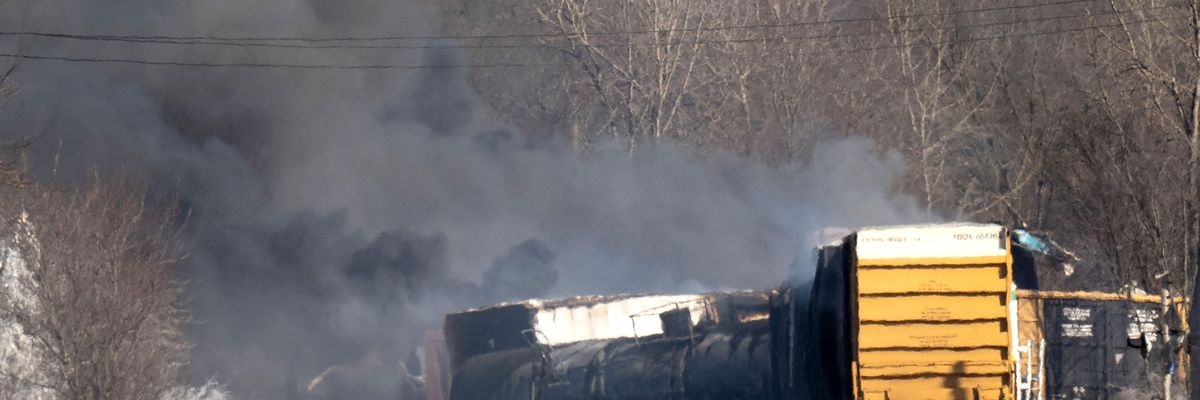Three weeks after the lives of East Palestine, Ohio residents were upended by a fiery wreck involving a Norfolk Southern-owned train overloaded with hazardous materials, rail union leaders on Friday implored federal regulators and lawmakers to "focus on the primary reasons for the derailment and take immediate action to prevent future disasters."
In a statement, Railroad Workers United (RWU) pointed to the National Transportation Safety Board's (NTSB) newly published preliminary report on the February 3 crash and subsequent burnoff of vinyl chloride and other carcinogenic chemicals, which suggests that an overheated wheel bearing likely caused the train to derail. The inter-union alliance of rail workers also cited NTSB Chair Jennifer Homendy, who said Thursday at a press conference: "This was 100% preventable. We call things accidents—there is no accident. Every single event that we investigate is preventable."
RWU, which has previously highlighted how industry-led deregulation and Wall Street-backed policies such as "precision-scheduled railroading" have made the U.S. rail system more dangerous, said Friday that "Class 1 freight rail carriers, including Norfolk Southern, have prioritized profits over safety, cutting maintenance, equipment inspections, and personnel in all crafts while increasing the average train size to three miles or more."
In the words of RWU co-chair Gabe Christenson: "Railroad workers experience firsthand every day the dangers inherent in this style of railroading. It has impacted their safety and health, state of mind, and lives on and off the job."
"Limits on train lengths and weights are necessary to prevent catastrophic derailments."
Jason Doering, general secretary of RWU, echoed Christenson's message, saying: "Every day we go to work, we have serious concerns about preventing accidents like the one that occurred in Ohio. As locomotive engineers, conductors, signal maintainers, car inspectors, track workers, dispatchers, machinists, and electricians, we experience the reality that our jobs are becoming increasingly dangerous due to insufficient staffing, inadequate maintenance, and a lack of oversight and inspection."
"We recognize," Doering added, "that limits on train lengths and weights are necessary to prevent catastrophic derailments."
One week ago, RWU made the case for nationalization, arguing that the U.S. "can no longer afford private ownership of the railroads; the general welfare demands that they be brought under public ownership."
In the absence of such sweeping transformation, which remains far-off given the current state of the beleaguered U.S. labor movement, the alliance on Friday demanded that federal agencies and Congress move quickly to "rein in" Norfolk Southern and other profit-maximizing rail corporations that have fought regulations, laid off workers, and purchased billions of dollars in stock rather than investing in employees and safety upgrades.
Specifically, RWU called on regulators and lawmakers to:
- Ensure sufficient staffing to do the job properly, efficiently, and safely, with all trains operating with a minimum of a two-person crew;
- Cap train length and weight at a reasonable level to mitigate the increased likelihood of breakdowns, train separations, and derailments;
- Implement adequate and proper maintenance and inspections of locomotives and rail cars, tracks and signals, wayside detectors, and other infrastructure; and
- Standardize ample training and time off without the harassment of draconian attendance policies.
Of these measures, only a proposed rule to require two-person crews—described by RWU as loophole-ridden—was included in the blueprint the U.S. Department of Transportation (DOT) unveiled Tuesday to hold rail companies accountable and protect the well-being of workers and fenceline communities.
The DOT also encouraged rail carriers to voluntarily provide sick leave. Norfolk Southern—facing intense scrutiny and backlash amid the ongoing East Palestine disaster—agreed Wednesday to provide up to a week of paid sick leave per year to roughly 3,000 track maintenance workers.
But because the Biden administration and Congress recently imposed a contract without paid sick leave on rail workers who were threatening to strike, the vast majority still lack this basic lifesaving benefit, as do millions of private sector workers in other industries who are also awaiting legislation to address the issue.
Characterizing the DOT's plan as inadequate, RWU said Tuesday that "rank-and-file railroad workers can diagnose and fix the problems" and urged U.S. Transportation Secretary Pete Buttigieg to enact "some of our solutions."
RWU treasurer Hugh Sawyer reiterated that call on Friday.
"We demand that the railroad be run safely, efficiently, and professionally, and not as some 'cash cow' for Wall Street investors and billionaires," said Sawyer. "Much of what is wrong with the rail industry today can be fixed easily and quickly by acting on what is outlined above. We demand action NOW."




